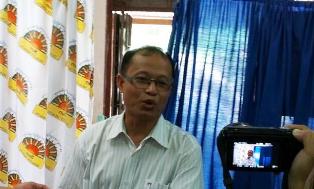A select group of Myanmar media saw for themselves progress being made by the Government of Myanmar in meeting international commitments it made on improving family planning across the country at two UNFPA-sponsored family planning facilities in Thanlyin Township, a low-income area in the outskirts of Yangon.
The visit organised by the UNFPA on 14 November 2013, coincided with the Global Family Planning (FP2020) conference which was held in Addis Ababa, Ethiopia. At the conference, the Government pledged to reduce unmet needs for contraception and increase contraceptive prevalence rates to 50 percent by 2015. This means that an estimate of 900,000 women of reproductive age in the next 7 years will have access to family planning. About one fourth of Myanmar women of reproductive age currently do not meet their needs for family planning, although they have said they would like to practice contraception.
The two sexual and reproductive health facilities in Thanlyin are sponsored by UNFPA and operated by development partners, Marie Stopes International (MSI) and Population Services International (PSI). UNFPA contributes in Myanmar with $6,813.658 for the reproductive health and $811,566 for the HIV/AIDS programme.
The group first visited the MSI sexual reproductive health clinic which on a daily basis sees approximately 40 clients a day, the majority stem from rural areas. The clinic provides family planning services such as birth control pills, emergency contraceptive pills, injectable contraceptives, male and female condoms, Intra Uterine Contraceptive Devices (ICUD) and implants, in addition to anti-natal care, cervical cancer screening and prevention, testing and treatment for Sexually Transmitted Infections (STIs) and HIV/AIDS.
The clinic also functions as a youth development centre where youth peer-educators inform adolescents about prevention against unwanted pregnancies and STIs. Approximately 20,000 women are of reproductive age out of a total population of 190,000 in Thanliyn Township. It is home to the largest port in the country, the Thilawa port. The MSI clinic covers about half of the villages in the township.

At the PSI run Taw Win clinic in the centre of Thanlyin, they treat around 40-50 people a day. A doctor working at the clinic, Dr. Tun Tun Win, said that the local community “has some knowledge about family planning,” or birth spacing as it is referred to in Myanmar. “Birth spacing is proven successful because the number of abortions has significantly declined. The most popular form of contraception is the Depo-Provera jab, which lasts for 12 weeks,” said Dr. Win.
Most of the patients that come to the clinic receive reproductive health treatment, and treatment for other ailments such as sexually transmitted infections (STIs), pneumonia, dengue, malaria and tuberculosis (TB).


